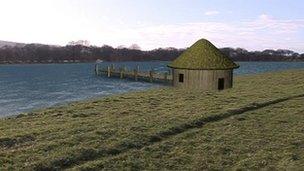Star Carr archaeologists given more than £1m in funding
- Published
Archaeologists excavating what they claim is Britain's oldest house have secured more than £1m in funding.
The circular structure at Star Carr near Scarborough was found in 2008 and dates from 8,500BC.
Archaeologists from the Universities of Manchester and York say the site is deteriorating due to environmental changes.
The European Research Council has given them £1.23m to finish the work before information from the site is lost.
Time running out
Nicky Milner, an archaeologist from the University of York, said the site was deteriorating rapidly.
"The water table has fallen and the peat is shrinking and it is severely damaging the archaeology," she said.
"The water keeps the oxygen and bacteria out and because they are now going into these deposits that is causing a lot of problems.

The area was settled by hunter gatherers about 11,000 years ago
"We haven't got much time left to excavate and we want to do some specialist analysis before all this important information vanishes forever."
The site was first discovered in the 1940s and has since been the subject of extensive research.
The latest excavation led to the discovery of what would have been a 3.5 metre diameter house occupied by hunter gatherers about 11,000 years ago.
The remains were dated by radio carbon and the type of tools used helped identify the house as being from 8,500BC.
Large settlement
The discovery suggested that people from this era were more attached to settlements than had been previously thought.
Items such as the paddle of a boat, arrow tips, masks made from red deer skulls, and antler head-dresses which could have been used in rituals, have all been uncovered.
Dr Milner said: "What we have here is a massive site, we have structures and we have a timber platform on the edge of what would have been a lake. This suggests that people were living here for quite a long period, for generations, in a large group.
"We have to do more excavation to understand more."
Star Carr would have been settled at the end of the last Ice Age and the team believes it may also offer insights into how people reacted to climate change.
- Published10 August 2010